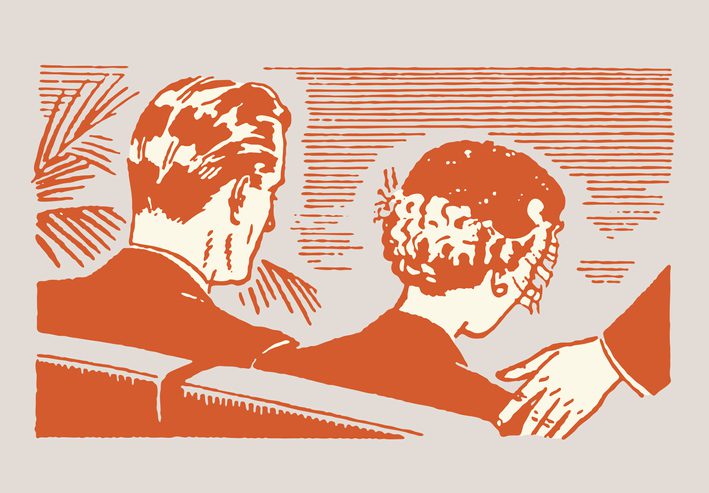I blame the Queen. Her funeral on TV was spectacular. Had she not had such a splendid send-off, I doubt Liz would have given her own demise any thought at all. Instead, as the Queen was lowered reverentially into the vault and the lone piper skirled the last lament, Liz announced, “I want that. That’s the way I want to go.”
“Rightio,” I said. “I’ll keep that in mind.”
Liz looked at me from her armchair and smiled a gummy smile. “Make it an event,” she said.
“Of course. Although we haven’t got a vault.”
“Oh, not that bit,” Liz said dismissively. “A vault would be far too cold. Give me sunshine and flowers.”
***
It was fortunate that Liz mentioned all this to me when she did because when I came home the very next afternoon after playing golf with Charlie, I found her face down on the lawn underneath the clothesline. When I rolled her over, she had a muddy nose, the complexion of blue putty, and a fixed, cold stare.
The ambulance guys obviously thought she was well gone because they didn’t even attempt to jump start her. “Call the police,” one told the other while I watched them do nothing.
“What for?” I asked.
“Sudden death. We always have to call the police.”
The policeman … Stevenson, his name was … looked down at Liz from a tremendous height. “Leave her,” he ordered, when I tried to pick her up.
“I want to take her inside,” I protested, “or at least get her off the grass.”
“Not yet. This could be a crime scene,” he advised me. “Did your wife have any enemies?”
Liz? The man was mad.
“Got to ask,” he said. “Could be foul play. Anything missing?”
“Like what?” I said, bewildered. We were standing in the garden; what could be missing?
Stevenson looked at Liz’s off-white underwear billowing in the breeze with the enormity and contour of spinnaker sails. “Never mind,” he said, answering his own question.
The local GP was called to tell us if Liz were dead. “She’s dead,” she announced, fingers to Liz’s throat.
“Probably her dodgy ticker,” I suggested. “It’s going to be the death of her one day.”
The GP agreed, and Stevenson looked disappointed. “Fine,” he said, “you can call the funeral director now.”
Mr Baxter arrived with his hearse. He was a small man with a deferential manner and a slight lisp who seemed to know his business although he hardly inspired confidence.
“Thith ith Lith?” he asked, as if I had multiple wives lying dead around the house.
“It is,” I replied.
“Don’t you worry,” Baxter said, hand on mine. “I’ll look after her.”
When Baxter drove his hearse away into the evening darkness with my Lizzie in the back, I felt quite lost. Then the girls and their families turned up and everything was almost okay again.
***
Baxter returned Liz to us a day later and, I have to say, she was the best-looking corpse I’ve ever seen. Apart from one wonky eye, she was beautiful with her coiffured hair and Sunday-best dress. We placed her coffin on the dining table for her to lie in state for a bit because that’s what Liz wanted, and it worked very well except that conversation at mealtimes was somewhat difficult.
On the second day, Charlie came around with the old cart he had in his farm shed. “It’s a bit rickety,” he commented as we stood there and examined it.
“We’ll manage.”
We men – widower, friend, sons-in-law and grandsons – hefted Liz’s coffin onto the back of the cart. It rolled on very easily, which is when we discovered the cart tray was covered in small, round pebbles and needed a sweep. By then it was too late; Liz was loaded, or most of Liz anyway because the cart wasn’t quite long enough and Liz’s top end hung off the back.
“Do we need a flag?” Charlie said, pinching his lip.
“We’ll have to use a tablecloth,” I replied. “We don’t have any flags.”
“I meant for the overhang. The road code says we have to tie a flag on anything hanging out the back of a vehicle.”
“The Queen didn’t have one of those,” I said, and that was that.
Our eldest daughter found a tablecloth without food stains. It had been through the wash with a red jersey at some point in time so was a delicate pink. We spread it over the coffin and then decorated the cart with spring blossom and daffodils. Liz looked a right picture. I was quite overwhelmed for a moment.
Charlie had been apologetic that he didn’t have a horse for the cart, but we didn’t need one. If the Queen was pulled through the streets by the military, then it was only proper for Liz to trundle through town under manpower, too.
Our procession set off at a sombre, slow walk. My 10-year old grandson was in front playing the funeral march on his cornet while his little brother pounded a biscuit tin. Fortunately, the funeral march only has about five notes as that was the limits of my grandson’s skill, although he improvised occasionally and surprised everyone, probably including himself, by adding a number of unexpected and off-key notes at random moments.
Following the boys, Charlie, my three sons-in-law, older grandsons and I hung onto the cart shafts. After a bit we got into a rhythm, marching in step so that the cart developed a real swing from left to right to left.
Then, of course, came Liz, pretty in pink.
And in behind, our three daughters, doing the formal mourning. They should have worn black; our youngest wore fluorescent yellow. I suspect she was more concerned with self-preservation than commemorating her mother’s joyous life.
I set a modest course around the block which I estimated would take 45 minutes. All started well. We caused a bit of a traffic jam on the main road, but once we turned off, it was quieter. People started coming out of their houses to see what the noise was and a lot of them took photos. Liz would have been thrilled. The procession was everything Liz could have wanted and more. I was proud of my family; we’d done her well.
Toward the end of our route, we had to climb a short but sharp incline to get back onto the main road. I realised as we were straining against the shafts of the cart that, possibly, I’d underestimated the effort needed to get up the hill.
“Can you push?” I yelled over my shoulder to my daughters following the cart. They put their weight in behind and things became easier for a bit until there was a rumbling noise, an unexpected sideways shove, screams from my daughters, and a loud THUD and clatter on the road.
“She’s fallen off!” cried my eldest. She sounded traumatised.
Too many of us turned to look and the next moment the cart was rolling backwards.
“Hold it!” Charlie ordered in panic, our feet sliding on the asphalt as we tried to arrest the backwards momentum.
“PUSH!” I shouted, and slowly, we started making progress again with the cart.
The problem with carts is that they have no handbrake. A horse might have been able to hold Liz’s carriage halfway up the hill, but we weren’t able to. There was nothing for it but to keep going until we reached level ground again, which is how I tried to explain it to the policeman, Stevenson, when I ran back to fetch my wife. He didn’t look impressed.
Personally, I couldn’t believe his timing. He must have been pulling up behind us right at the moment we tipped Liz out, so when I jogged back down the slope he was already out of his car and contemplating the scene.
“Mr Markham,” he exclaimed, “what are you doing?”
“It’s a funeral procession,” I said. “Is there are law against that?”
His eyes lost focus for several seconds while he appeared to trawl his brain for any such laws. If he found one, he didn’t say. He refocused on me and pointed at Liz where she lay face down on the road next to her coffin, surrounded by a potpourri of crushed flowers.
“We can’t have your wife lying on the ground,” Stevenson said. “It’s not decent.”
“It didn’t trouble you the other day,” I said, which possibly wasn’t wise.
“MOVE HER,” Stevenson roared.
We moved her, placing her back in her box, and carrying it uphill to the cart. Stevenson stood motionless where I’d found him, watching us with his arms folded, until we were back on the march. Then he drove his car right behind us, its red and blue lights flashing in agitation, until we reached our gate. Having escorted us to our destination, he drove off without a wave.
***
Baxter looked no happier when he came to pick Liz up for the funeral.
“What happened?” Baxter asked, studying the scrapes along the edge of the coffin. “What hit it?”
“The road,” I replied.
He raised his eyebrows. “And the nails? What are the nails in the lid for?”
“That’s so she doesn’t fall out,” I explained.
Baxter blinked rapidly for several seconds.
“It’s all right,” I reassured him. “The police know all about it.”
***
We had the funeral at the crematorium overlooking the sea. The coffin lay up the front and the rest of us sat in the pews where we could watch the waves when emotional or bored.
A cloth had been draped over the coffin so that the scrapes along the woodwork were hidden, and on top was a wreath of lemon-yellow roses, along with Liz’s sun hat and wooden spoon.
We sang the hymns Liz wanted, and people spoke of how lovely she was. We shed a few tears, laughed a lot, grew thoughtful and sentimental.
We remembered the best of her, my Liz.
***
Stevenson was back on my doorstep late that afternoon once the funeral was over and most people had headed away. I opened the door to find him standing there, scratching his forehead.
“Officer Stevenson,” I said pleasantly.
“Mr Markham,” he responded, pulling himself up to full height. “Where is she?”
“Who?”
“You know who I mean.”
“We had her funeral today.”
“I know that,” said Stevenson, “but your wife wasn’t there.”
“She wasn’t?”
Stevenson dropped his chin and glowered at me. “Don’t play games with me, Mr Markham. You filled her coffin with sandbags. I want to know what you did with her.”
Well, I won’t be using that funeral director again the next time I need to bury my wife. So much for respecting a sealed coffin.
There wasn’t much point pretending anymore, so I took Stevenson around the back to where I’d put Liz. It was very tidy. The boys had done a great job of restoring the flower bed and planting it up again with new roses and penstemons.
“You buried your wife,” said Stevenson. It wasn’t quite a statement or a question; possibly more of a statement, but one he was having trouble believing.
“It’s what Liz wanted,” I told him.
The policeman huffed a few times. “How far down?” he said eventually.
I shrugged. “Two feet.”
“Oh, you made a real effort.”
Now, that was a bit unfair. “We hit water,” I explained. “She’s not fond of swimming.”
“Dear God,” muttered Stevenson, looking heavenwards. “She can’t stay there, you know,” he added, coming back down to earth.
“Why not? You’d have no problem if I scattered her ashes here. What’s the difference?”
I swear the man was twitching by now. “A cremation?” he suggested, sarcastically.
“Well,” I said, offended. “There’s no need for that. Sunshine and flowers. That’s what Liz wanted. What Liz wants, Liz gets.”
***
As it turns out, Liz doesn’t always get what she wants. Who’d have thought.
About the Author: Lianne Darby
Lianne has been a land surveyor, wife and number-one farm assistant to a dairy farmer, and now works as a planner with the City Council. Born and bred as a North Islander, she saw the light and moved south to Dunedin 22 years ago. Her days are spent writing reports on subdivisions and residential development while her weekends are spent writing stories. It’s all about creation in its different forms.







